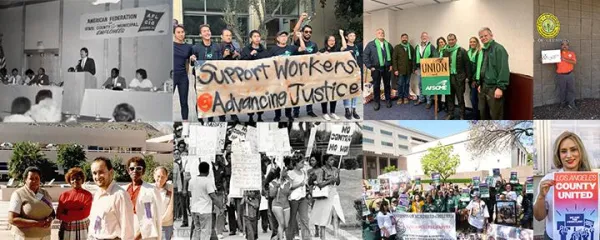A History of Fighting & Winning for Workers

AFSCME District Council 36 was chartered by AFSCME International’s President Jerry Wurf and Executive Board in 1969. Today, the Council more than 68 Local Unions and nearly 30,000 employees, from MTA supervisors to legal aid workers, from Sec. 8 eligibility workers to psychiatric social workers, from sanitation workers to librarians to civil engineers.
The early years of the Council’s history, in the pre-collective bargaining law days, was character-ized by the struggle to win fair contracts from local government employers who had no obligation to sign binding agreements. The first Executive Direc-tor was Henry Fiering, a former organizer with the Congress of Industrial Organizations.
One of the enormous labor achievements during this time was the passage of the state’s Meyers-Milias-Brown Act in 1968 — granting local public employees the lawful right to negotiate a fair return on their labor. In the ‘70s and ‘80s, thanks to the MMBA, membership in public sector unions — and job actions and strikes — skyrocketed.
Throughout, the AFSCME International structure brought autonomous locals, including several (Torrance Municipal/Local 1117, LA County Probation/Local 685, etc.) that were previously chartered by AFSCME in the 1930s and ‘40s, under one Council 36 umbrella to pool resources and power. Great battles for representation rights in both the City and County of Los Angeles resulted in the formation of additional independent Local unions. At the same time, Orange County Eligibility Workers organized and joined Council 36. Along with San Diego/Local 127 and San Bernardino and Ontario City employees/Local 3061, the shape of the Council as a regional force in local government was solidified.
The ‘80s brought a different sort of bargaining fight to many tables, as social policy had joined economic policy as subjects of worker concern. In 1985, Los Angeles City clerical workers and librarians signed the first pay equity agreement in history with the City of Los Angeles, standardizing parity for female-dominated classifications. The years to come would see similar groundbreaking agreements signed by Council 36 Locals, involving family leave, domestic partner benefits and domestic violence prevention.
With the downturn of the economy in the early ‘90s, public employers largely sought to balance budgets on the backs of their employees. Creative bargaining and the exercise of political action helped protect wages and benefits and secure jobs for thousands of AFSCME members who were increasingly threatened by calls for outsourcing.
The forces of nature simultaneously provided a different kind of challenge. When a great fire nearly destroyed the huge Central Library of the City of Los Angeles, the LA City Librarians Guild and LA City Clerical and Support Staff Unit launched a desperate struggle to save the collection. Again, when the 1994 Northridge earthquake rocked
LA, a number of Council 36 Locals stepped up by organizing relief efforts to aid residents whose lives had been disrupted by the disaster.
The early ‘90s also brought new growth milestones, as Council 36 realized a longstanding dream of purchasing its own building a few miles west of the Los Angeles Civic Center, an area that would become the nerve center for labor activities.
The mid-‘90s, meanwhile, brought a whole new challenge to the public sector: Bankruptcy. Orange County experienced the largest public bankruptcy in American history. Council 36 led a massive fight to protect the workforce, including through bold legislative action.
In the coming years, Council 36 would grow its political action program, engaging in successful local and state campaigns throughout the region. In 1998, then-Executive Director Carol Wheeler coordinated volunteer efforts to help preserve labor-oriented majorities in the State Senate and Assembly, turn around an anti-worker majority in the California Congressional delegation, and elect a Governor who would respond to the needs of working people.
Council 36 also was instrumental in defeating an anti-worker “paycheck deception” measure, Prop. 226, in 1998 that would have handicapped unions statewide. (Similar measures were also defeated with AFSCME’s help in the years following).
Council 36-driven political campaigns in the LA Superior Court system and Metropolitan Transportation Authority made it possible for more than a thousand additional AFSCME members to gain job security and opportunities to advance.
When reckless banking policies crashed the economy in 2007, the Council went into overdrive to avert layoffs and furloughs and save pensions threatened by budget cuts across the Southland.
Today, Council 36 is viewed as a political powerhouse that together with AFSCME’s Sacramento office continually sponsors state laws to expand worker rights. The Council regularly supports AFSCME-friendly candidates in cities, counties and other jurisdictions employing our members. In the face of continued threats, Council 36 is organizing aggressively to increase membership ranks and bring unrepresented workers into the AFSCME family. We have affiliated a number of nonprofit, private sector Locals, as well, which represent legal aid staff, museum docents, vocational counselors and immigrant rights advocates, among other workers.
Despite our many successes, Council 36’s chronicles, like most labor history, is one of incessant struggle. The enemies of working people never go away.
